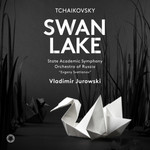|
Back
01/05/2019
Pyotr Ilyich Tchaikovsky: Swan Lake, opus 20 (1877 world premiere version)
State Academic Symphony Orchestra of Russia “Evgeny Svetlanov”, Vladimir Jurowski (conductor)
Recording: Philharmonia 2, Rachmaninov Hall, Moscow, Russia (February 2017 and February 2018) – 151’46
Pentatone # PTC 5186 640 (SACD Hybrid Multi-channel) – (Distributed by Naxos of America) – Booklet in English and German

   
At first blush, an Origami white swan gracing this CD’s cover makes an elegant, thoughtful statement of Pyotr Ilyich Tchaikovsky’s classic ballet. As an insert, Pentatone’s 27-step guide in creating the cygne en papier metaphorically underlines the essence of cuts, lines and angles methodically made to solidify Tchaikovsky’s 1877 world premiere.
It’s difficult to imagine a Swan Lake blackout period from 1883 until 1894. Like an injured Origami bird, Tchaikovsky’s 1877 score was badgered by revisions (choreographically and by music additions from other composers) since its premiere that eventually maimed the work in 1883. Revitalization (primarily through Marius Petipa’s reworked libretto and Riccardo Drigo’s orchestral refinements) brought the ballet back to the stage on January 15, 1895. And while most of today’s ballet companies follow this rendition, it brings back the pertinence of Tchaikovsky’s organic purity and the importance of this release.
Illustrious conductor Evgeny Svetlanov’s name, synonymous with the State Academic Symphony Orchestra of Russia, conjures the word ‘academic’, thereby translating forward to the honorable panorama paved by Vladimir Jurowski…which gets to the maestro’s brilliant intention in his forward. He’s quoted: “…Today it’s almost impossible to appreciate the music of the original version, unless you perform it in a concert, where there’s no need to adapt to the dance, and where you can play all of the music.” That is why the conductor should be greatly fęted.
This Swan Lake is emphasized as a symphonic score, and to that extent, M. Jurowski is irrefutably correct. We look at what Tchaikovsky originally penned in comparison to Drigo’s 1895 appropriated directives. Nuances of modification and orchestral trimmings are faithfully achieved while adhering to meticulous tempos and instructional detail.
Those fascinated with what is included in this score can be discerned by meticulous aficionados. Example: the “Tempo di valse” inside Act II’s Danse de cygnes returns a second time [ref: n° 13, Danse de cygnes III]; “The Ballabile” (Danses de corps de ballets et des nains); the Pas de six (including its opening, five variations and coda) remains intact. [Note: this is one of the most interesting passages of this score.] Additionally, the foreign dance, Danse russe, (written by Tchaikovsky to honor ballerina Pelagia Karapakova) survives. A lovely violon solo entrée lasts for a minute and a half before strings blend into the matrix. The rapid coda finish holds great attention.
What is it that reverberates an unusual dimension of this work by Tchaikovsky? It’s steeped with a glowing flow and a one-step-back orientation as it relates to dramatic detailing, gently pulling away from the balletic schematic. We hear all sorts of perfection in instruments which tend to be, otherwise, scuttled inside a dance performance. Most noticeable is the stronger legato carryover and fluidity from start to finish, relinquishing the sudden melodramatic ricamo fundamentally required in a staged production. Instruments come alive with an arresting display: brass praises have poignant eloquence; woodwinds act their part, many times as a ‘contra counter’ to the orchestral remains alongside a generalized cinematic and majestic rollover.
Vladimir Jurowski’s concert-driven maneuver of Swan Lake is a pičce de résistance: core-centered, and a discovery of select seldom-heard music. Graced with stellar acoustics, Pentatone’s issue is a serious contender for those cherishing attention to microscopic detail within a historical perspective.
...the Origami bird takes flight and prevails through sharp folds and soft suggestions. Vladimir Jurowski has absolute superiority over Tchaikovsky’s music.
Christie Grimstad
|